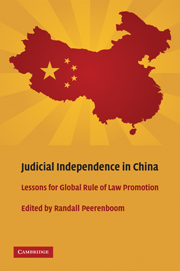Book contents
- Frontmatter
- Contents
- Contributors
- 1 Introduction
- 2 Halfway Home and a Long Way to Go
- 3 A New Approach for Promoting Judicial Independence
- 4 The Party and the Courts
- 5 Judicial Independence in China
- 6 A New Analytic Framework for Understanding and Promoting Judicial Independence in China
- 7 Judicial Independence and the Company Law in the Shanghai Courts
- 8 Local Courts in Western China
- 9 The Judiciary Pushes Back
- 10 Corruption in China's Courts
- 11 A Survey of Commercial Litigation in Shanghai Courts
- 12 Judicial Independence in Authoritarian Regimes
- 13 Judicial Independence in East Asia
- Index
- References
8 - Local Courts in Western China
The Quest for Independence and Dignity
Published online by Cambridge University Press: 05 June 2012
- Frontmatter
- Contents
- Contributors
- 1 Introduction
- 2 Halfway Home and a Long Way to Go
- 3 A New Approach for Promoting Judicial Independence
- 4 The Party and the Courts
- 5 Judicial Independence in China
- 6 A New Analytic Framework for Understanding and Promoting Judicial Independence in China
- 7 Judicial Independence and the Company Law in the Shanghai Courts
- 8 Local Courts in Western China
- 9 The Judiciary Pushes Back
- 10 Corruption in China's Courts
- 11 A Survey of Commercial Litigation in Shanghai Courts
- 12 Judicial Independence in Authoritarian Regimes
- 13 Judicial Independence in East Asia
- Index
- References
Summary
All justice emanates from the King. It is administered in his name by the justice whom he nominates, and whom he institutes.
– A constitutional adage in France until the 1830 Constitutional CharterINTRODUCTION
In the north-central province of Shaanxi, as I was waiting to interview a judge, I noticed a small exercise book on his office desk. The same sort of notebook, brown and cheap, that Chinese children use for their homework. To start the conversation, I gently asked what he used the notebook for and was told that it was for his political homework assignments. The last page the judge had filled in was a handwritten copy of the Charter of the Chinese Communist Party (CCP).
As I decided to further explore the issue of grassroots judges' political culture in predominantly rural areas, I observed that although most of them share similar political and intellectual references, they do not have a strong common legal culture. For example, most of them believe that one-party rule is the key to stability, that party members are the elite of the country, that law's main goal is to be punitive, that the state constitution is purely ornamental, that judges are above all civil servants, and that the judiciary must be supervised by the people's congresses. Those recurrent political references reflect the judges' knowledge of the world. Put differently, their legal backgrounds appear highly politicized.
- Type
- Chapter
- Information
- Judicial Independence in ChinaLessons for Global Rule of Law Promotion, pp. 154 - 179Publisher: Cambridge University PressPrint publication year: 2009
References
- 1
- Cited by

